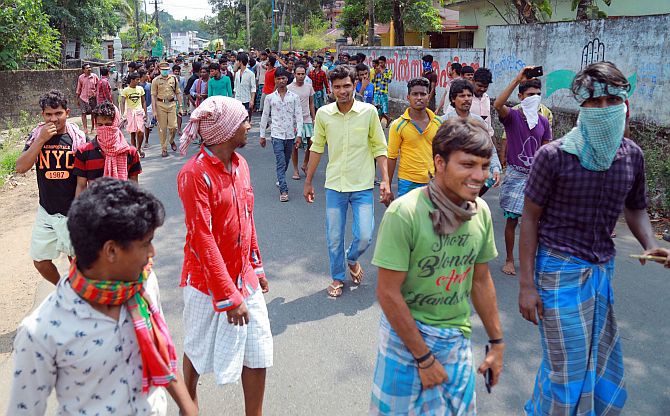As the world awaits the end of the global pandemic, rural Bengal might be witnessing a recession unfolding in bits and pieces.

At Gobardhanpur, one of the last villages in the deltaic Sundarban region, there is deep fear of a coronavirus outbreak among locals.
In only two days, March 19 and 20, before interstate train services were suspended on March 21, hundreds of migrant workers arrived in the area, mostly from southern states, say locals.
“Two days prior to the lockdown, close to 100 people came in two villages here.
"The villagers immediately informed the local administration, which instructed these migrant workers to stay at home.
"Now, villagers are keeping a strict vigil on their movement,” says Biswadip Sahu, a fisherman at Gobardhanpur.
Hiron Raut, along with nine others, arrived at his native Buraburir Tat village, adjacent to Gobardhapur, from Kerala about 10 days earlier.
Back there, he earned Rs 600-900 a day as a construction worker. His savings will soon get exhausted.
The state government has announced Rs 1,000 a month to daily wage earners but he’s sceptical.
“Whatever money we had will be exhausted in the next 15-20 days.
"I don’t know how I will survive after that.
"I am not sure how long the government will support us,” he says.
No cushion here
As thousands return home in West Bengal amidst the pandemic, they are being seen as a liability and unwelcome guests in their own homes.
And, distress in the rural economy is already visible.
“Many small grocery shops in rural areas have permanently shut down; they are unable to buy essential food items at high prices from big traders.
"This rural distress might take mammoth proportions.
"As far as these migrant workers are concerned, they are quite prone to exploitation, as there will be an oversupply for labourers in rural areas,” said Dilip Benerjee, an Ashoka Fellow who has studied migration patterns in Bengal.
“These migrant workers who are now back home are seen as a huge liability on the local economy.
"They don’t have the requisite skills to be employed in agriculture,” says Aniruddha Dey, executive director, Professional Institute for Development & Socio Environmental Management, an environment consultancy.
Indrajit Das used to work at a textile mill in Tamil Nadu.
He is worried at being forced to take up farming, the only source of livelihood at his native village of Chimta in the Sundarbans, which is yet to get an electricity connection.
“It will be a big challenge for me; I never did it before. But, I will be forced to do it if things remain like this for long,” he says.
However, Das says he considers himself lucky to have returned home.
His fellow workers in Chennai informed him a day earlier that they were having a tough time in getting meals twice a day.
“Many of my friends could not come back and they have said they are having a difficult time in getting a full meal.
"The workers of Bengal will not be helped in Tamil Nadu," he adds.
“This pandemic is mostly an urban phenomena and people rushed to rural areas as they perceived it as safe haven.
"But, due to the sudden increase in labour supply there, market wages, including that in agriculture, will come down.
"These people would now depend upon MGNREGS (Mahatma Gandhi National Rural Employment Guarantee Scheme) for work but the worrying fact is that on an average in the past four years under the scheme, employment was provided for only 40-45 days in a year.
"Also, under MGNREGS, daily wages are much lesser than even agricultural wages,” says K R Shyam Sundar, professor of human resource management at Xavier Institute of Management, Jamshedpur.
Nothing at home
According to the 2011 Census data, Bengal ranked fourth among states in outward migration. The numbers have only gone up since then.
In the past two decades, the state has seen a massive wave of outward movement, especially to Kerala, Tamil Nadu, Delhi and Maharashtra.
With factories and tea gardens closing down, agricultural income falling and storm Aila ravaging a large part of deltaic West Bengal in 2010, migration gradually became a norm.
“In 2001, West Bengal was net-positive in terms of migration but by 2011, it turned net-negative. Long-term policy failure, a demographic transition that added a large young population and agrarian stagnation led to this wave of outward migration, and it has been growing,” says Rabiul Ansary, assistant professor, department of geography, Utkal University.
Migration is itself also an industry in parts of rural Bengal.
“Wherever people got easily absorbed, they went.
"There are agents who act as mediators for providing jobs to young people, especially school dropouts in their early teens.
"Those who go as migrant workers, themselves become agents after a few years,” says Dey.
In the southern states a construction worker can earn as much as Rs 500-900 a day.
In West Bengal, agriculture yields not more than Rs 200-300 a day.
“These people (returnees) came in a jiffy and many didn’t even get time to collect dues from their employers. They can barely survive for 20-25 days,” says Pranabesh, a social worker with Sundarban Green Environment Association.
In North Bengal, another hotspot of outward migration, many women left their homes for working as domestic helps in north Indian states.
Unlike their male counterparts, not many have been able to come back home.
“Many workers wanted to come back but couldn’t. Several came in goods trucks and the police took them to hospitals for check-up. Now, tea garden workers also apprehend that once the gardens open, they will not be paid for days.
"There is also a fear that many migrant workers will not get jobs for long, as they might be ostracised,” said Nita Dhar, senior programme coordinator at PRISM.
As the world awaits the end of the global pandemic, rural Bengal might be witnessing a recession unfolding in bits and pieces.












 © 2025
© 2025